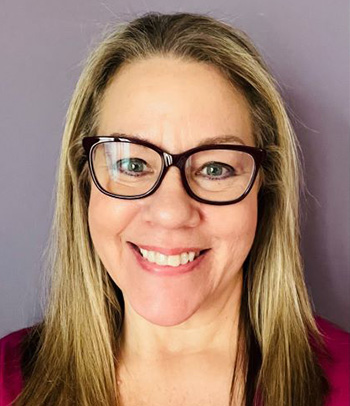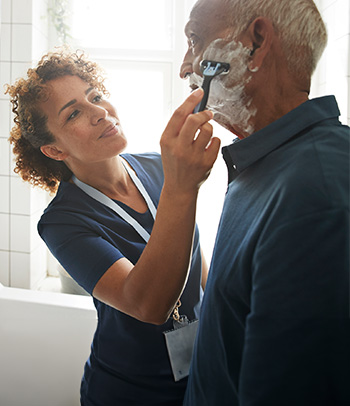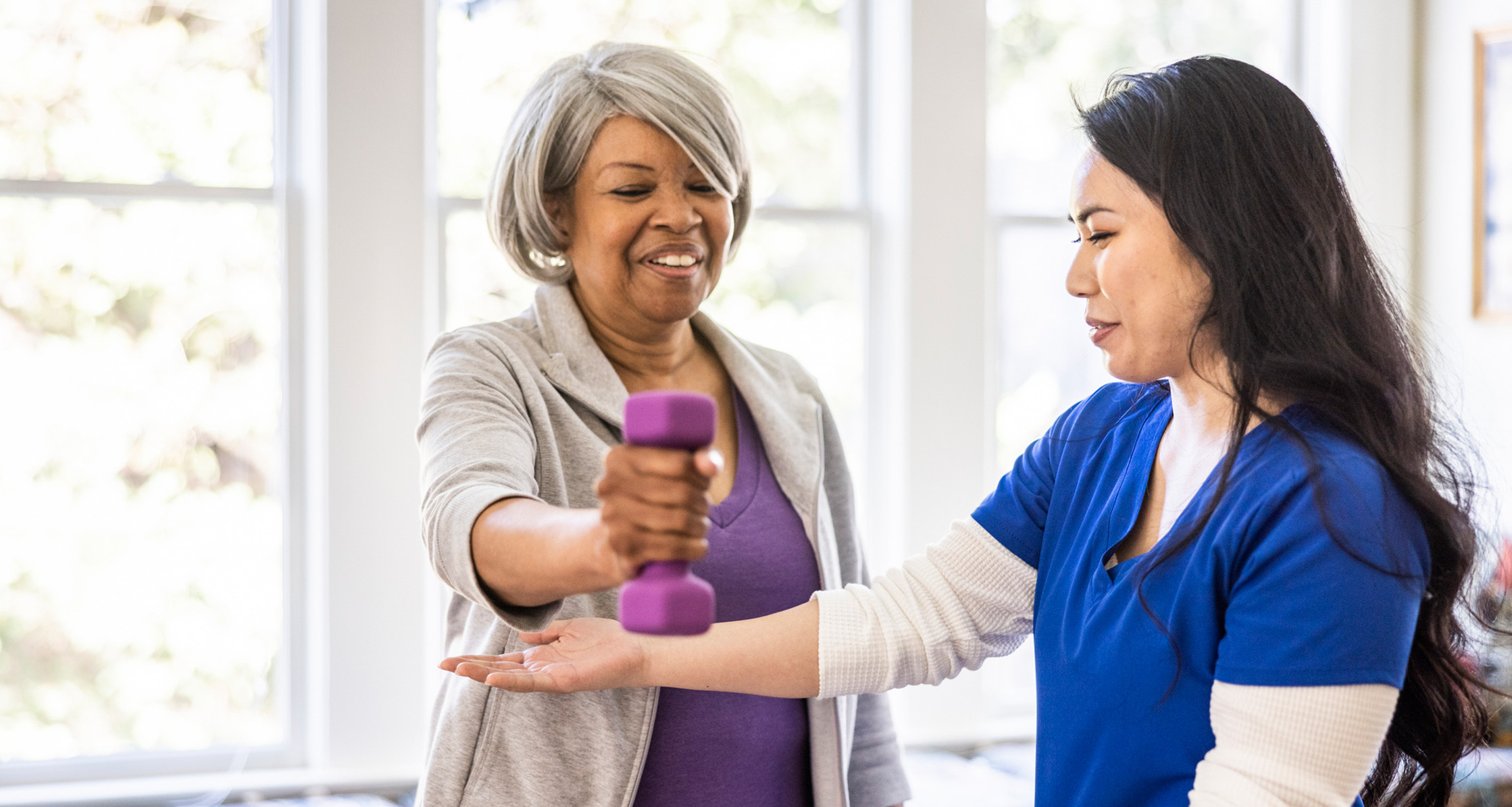VA, in partnership with its vast network of community providers, offers many different home health care options to meet the needs of our country’s aging, wounded and disabled Veterans.
For many of us, staying at home as we age or manage a chronic condition or injury is important. For some, remaining at home provides a sense of independence and dignity. For others, it provides a way to stay connected to family, friends, pets and the comforts of home.
But for many Veterans and their families, staying at home can be challenging without support. Loved ones may work outside the home, leaving little time for caregiving duties. Some medical conditions or injuries may require a skilled medical professional to handle them properly. Others may not have a support network to rely upon for care despite longing to stay in their own home.
The Department of Veterans Affairs (VA) recognizes these challenges and understands that connecting Veterans and their families with quality home health care enables Veterans to remain at home safely and get the critical care they need.
VA, in partnership with its vast network of community providers, offers many different home health care options to meet the needs of our country’s aging, wounded and disabled Veterans.
We asked Dorrie Emmerich, Director of VA Services at one of the community-based home health care agencies that partners with TriWest Healthcare Alliance (TriWest) in VA’s CCN Regions 4 and 5, to share her experiences, highlight what she sees as the benefits, and explain the many home health care services offered to meet the needs of Veterans and their families. Dorrie’s colleague, Dwan Denk, a U.S. Navy Veteran, registered nurse (RN), and business owner, also shared her insight about home health care work with Veterans.
Care in the Home
Dorrie has spent many years working in the health care industry. Her job is to help her community-based home health care agency’s network to become credentialed providers to get Veterans the care they need.
“Veterans dedicated their lives to defending our nation,” she said. “We recognized their need and chose to focus our efforts in that area. I’m so grateful to be able to help Veterans get the care they need.”
With Dorrie’s expertise and hard work, she helped her home health care agency provide care to more than 5,200 Veterans in 2023.
A Changing Population
Community-based home health care agencies have watched as the country’s demographics have changed in the last several years, realizing the health care industry must change as well.
“Today, home health care is a necessary part of long-term care,” Dorrie said. In fact, her organization’s founder and CEO created the home health care agency after needing high-quality home health care for a member of her own family and being unable to find it.
According to the U.S. Census, the population of people aged 65 and over grew nearly five times faster than the total population in the last 100 years, reaching 16.8% of the total population in 2020. Veterans are included in this demographic shift as well. The U.S. Census states that nearly 50% of all Veterans were 65 years or older in 2020.
“As the population ages and advancements in technology and medicine help people to live longer, we have to make sure our elderly receive the support they need to live a superior quality of life until the very end,” Dorrie noted.
The Benefits of Home Health Care
There are many ways home health care can benefit Veterans and their families, but many people are unaware of their options or aren’t prepared when the time comes.
Dwan owns and operates one of the home health care agency’s community-based care offices in Texas. She shared how difficult it can be when the need for care arises and families aren’t ready. Dwan acknowledged that taking time off work to care for a loved one may be impossible for some families, and others may have little or no family support to begin with.
“This is when home health care can make a big difference. It can help to maintain family stability, as well as the safety of the person in need,” Dwan said.
Both Dorrie and Dwan have seen how addiction and mental health conditions have impacted families and typical support structures, making home health care a valuable option when people are isolated or without any additional support.
For those who need care, recovering at home is often the preferred place to be, Dwan shared. Families can continue to be involved and have peace of mind and stability.
“It allows the person receiving care to continue to be a part of their family and enjoy the support and care that they need,” she said.
Dorrie has seen how individuals thrive in trusting and stable environments.
“Being cared for with dignity and respect is important to any human being,” Dorrie said.
Dorrie has research on her side when it comes to the benefits of home health care, noting that studies have shown that recovery may be achieved faster and safer at home under proper care.
VA’s Office of Geriatrics and Extended Care found that Veterans who use these programs experience fewer hospitalizations and emergency department visits, reduced hospital and nursing home days and fewer nursing home readmissions and inpatient complications.
A Closer Look at Home Health Care Services
From skilled care after a hospital discharge to providing help with daily activities, home health care offers solutions for many individuals and families who need assistance. Dwan puts it this way: “Home health care has a vast range of services that in many ways can be tailored to the specific needs of the patient.”
VA offers different home-based health care options such as skilled home care, in-home supportive care and respite care. Each type of care can meet the different needs of Veterans and their families.
- Skilled home health care – Skilled care is primarily rendered by skilled professionals such as nurses, physical therapists or occupational therapists. Skilled care can be used by Veterans who need short-term care after a hospital stay or who are returning home from a nursing home, or for continuing care for Veterans with ongoing needs. Skilled services may include nursing, case management, physical therapy, occupational therapy, speech therapy, wound care, IV antibiotics, social work support, home safety evaluations, patient education and more. Dorrie describes skilled care this way: “Skilled nursing brings home the skill of a licensed nurse who follows a doctor’s orders. It can allow for a shorter hospital stay and also help with chronic conditions needing intravenous medication administration, wound care, IV antibiotic treatments and much more.”
- Homemaker and home health aide care – This type of supportive care is provided by a trained person who comes to a Veteran’s home daily, several times a week or once in a while to help the Veteran take care of themselves and manage their daily activities. Homemaker and home health care aides provide services such as help getting dressed, bathing, using the bathroom, moving from one place to another, going grocery shopping and more. Dorrie describes it as care designed to help those who need help to accomplish daily living tasks.
- Respite care – Respite care pays for care for a short time when family caregivers need a break, need to run errands or need to go out of town for a few days. Respite care allows caregivers to leave, knowing someone can cover and be present in the home. According to Dorrie, respite care can include everything from providing meals and grocery trips to giving a family member a much-needed break. “Through respite care, we provide someone with social interaction and safe support without taking away their dignity and independence,” she explained.
Connections that Endure
Dwan said when she talks to her Veteran clients and thinks about the service of home health care, she sees connections.
“It feels good to be able to connect with those who understand the loyalty of serving,” she shared. She takes pride in her work in health care and feels good providing a service that allows Veterans to feel pride and dignity as well.
“I have been told many times ‘You carry pride in the work you do. Just like when you put on that uniform and walk a little taller,’” she explained.
Next Steps if You’re Considering Home Health Care
How do you know if home health care is right for you and your family? VA offers helpful tools to aid in your decision-making. To figure out what services you may need or how long you may need them, check out the Veteran Decision Aid for Care at Home or in the Community. There’s also a Caregiver Self-Assessment to help caregivers identify their own needs and determine how much support they can offer.
If you decide home health care services may be right for you, the first step is to contact your VA social worker, case manager or primary care manager. They can help you understand what services you qualify for, what’s available in your area and how to request care. All approved referrals for care in the community must start with Veterans contacting VA first.
Dorrie’s passion for helping Veterans get the care they need highlights how VA and its partners are working to make high-quality health care available for Veterans at home. Reach out to see what services can best support you and your family, giving you the critical care you deserve.
Editor’s Note – Thank you to BrightStar Care for participating in this article, as just one of TriWest’s thousands of network providers caring for Veterans. If you are a network provider caring for Veterans, with a story about Veteran care to share, please email us at Media@TriWest.com.







